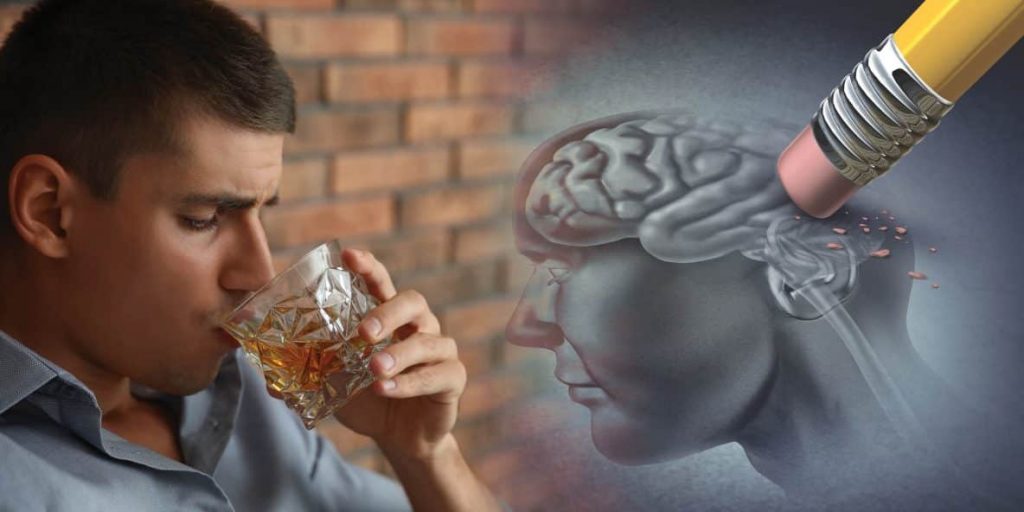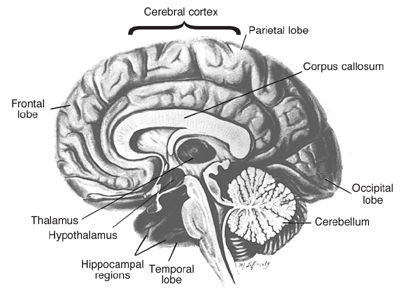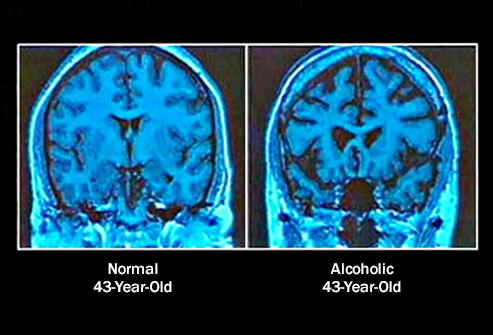-
Call Us: 0330 111 2015


Jump to a section ▼
› Introduction
› Effects on body & brain
› How alcohol works - Alcohol’s effect on memory
› How alcohol causes brain damage
› Treating alcohol addiction
Speak with our admission team
Call now on 0330 111 2015How alcohol affects you as a person largely depends on the amount of alcohol you consume, your personality and your genetics.
The content of this page is designed to help you understand how alcohol works, providing you with a scientific insight into alcohols effects on the brain and body.
When someone drinks too much alcohol it becomes evident in their speech and the way they hold themselves. They are likely to slur their words, become unsteady on their feet and may become drowsy. This is due to alcohol being a depressant drug and possessing depressant effects.
Alcohol is a drug in liquid form, its active ingredient ethanol has very toxic effects that work directly on our brain and place a great strain on our bodily organs.

So, how does alcohol work on the brain and body? Here, we take an in-depth look at how alcohol affects us and how it is processed once consumed.
Alcohol is not digested like other foods, rather it is absorbed into the bloodstream, broken down, processed then expelled (1)
Once alcohol is consumed, around 20 percent of it is immediately absorbed into the bloodstream through the stomach lining. The other 80 percent is absorbed into the bloodstream via the small intestines. Once in the bloodstream, alcohol is then quickly diffused throughout the body’s tissues and organs.
The bloodstream carries alcohol around the body and to the brain, with the active ingredient ethanol working on the brain within as little as a few minutes after consumption. This is when the effects of alcohol will start to be felt.
After approximately 20 minutes, alcohol reaches the liver and begins to be processed. On average our liver can metabolize one unit of alcohol every hour. This time frame is subject to a number of variables, including the livers health and the amount of alcohol consumed in one episode (1)
Alcohol is finally expelled from the body in a number of ways, including sweat and breath, but the majority of alcohol consumed leaves the body through urine. Whilst alcohol is present in our system it has a toxic effect on every single organ it comes into contact with.
How long alcohol stays in your system will depend on a number of factors personal to you.
Factors that can affect the speed at which you process alcohol include:
Alcohol stays in the bloodstream for around 24 hours and remains detectable by blood and breath sample for 12 to 24 hours after consumption (2)
Alcohol can stay in urine for up to 80 hours but your average urine test can only detect within a window frame of 2 to 4 days, sometimes less. (3)
The more alcohol that is consumed, the less efficient the body becomes at processing it and the longer it stays in the body, causing damage to tissues, cells and organs.
How alcohol works on your brain will be individual to you. You may notice that drinking alcohol makes you feel happier, calmer and more relaxed. On the other hand, it may make you feel sad, angry or even aggressive. This is because alcohol works on several areas of the brain at the same time, including the part of the brain that controls our emotions called the amygdala, contained within the brains limbic system. (3)

The cerebral cortex makes up the largest proportion of the brain and is responsible for processing information received from our senses. It is also responsible for the way we process our thoughts.
Consuming large amounts of alcohol can cause our senses to become distorted. At the same time, alcohol works on our behavioural inhibitory centre, reducing feelings of inhibition. These effects combined, can lead to bad decision making based on impaired judgment and misinformation.
What can seem like a ‘good idea at the time’ can often lead to feelings of regret, shame and remorse the next day… sound familiar? The more alcohol that is consumed the more pronounced and exaggerated these effects become. (4)
Whilst intoxicated, we are also more likely to make poor sexual choices. This is due to alcohol working on the brains hypothalamus and pituitary gland. These are the parts of the brain responsible for our sexual behaviour. With increased alcohol consumption comes increased sexual desire. Transversely, sexual function is impaired. Self-control is also compromised due to alcohol working on all parts of the brain that contribute to impulsivity and inhibitions (4,6)
When alcohol is consumed within the Chief Medical Officers safe drinking guidelines, little or no damage to the body’s organs will be caused. Damage to organs occurs when they are repeatedly subjected to alcohols toxins and can also result from the reduced absorption of nutrients from food.
Those that suffer from an alcohol use disorder (AUD) i.e alcoholism, are at a significantly increased risk of developing numerous alcohol related illnesses, conditions and diseases, including:
The list of physical harms goes on and on…
Alcohol also works on our immune system, depressing and weakening it. Those that suffer from alcoholism, are alcohol dependent, or are regular heavy drinkers, are much more likely to contract diseases such as tuberculosis and pneumonia.
Binge drinking alcohol also compromises the immune system, slowing the body’s ability to fight and ward off infections for up to 24 hours after drinking (9)
Alcohol affects our ability to recall events whilst under it’s influence. This is due to alcohol working on the brain’s limbic system, which is responsible for laying down new memories and controlling our emotions.
Drinking too much alcohol will likely lead to an exaggerated state of emotional wellbeing and may well lead to memory loss. In cases of binge drinking or regularly drinking large quantities, memories whilst intoxicated can be severely diminished. (4)
‘Alcoholic black-out’ (where events that took place whilst intoxicated cannot be recalled) occurs when the limbic system, along with other parts of the brain are heavily suppressed by alcohols effects, reducing the brain’s ability to form new memories (4)
The cerebellum part of the brain is responsible for movement and coordination of muscles. The cerebellum also controls fine motor function. As alcohols works, it suppresses the nerve impulses sent to the cerebellum. Muscle movements become uncoordinated as a result. This makes us more susceptible to accident or injury.
With repeated alcohol abuse and in cases of alcohol dependence, the cerebellum stops working as it should. The results include the shaking and jerky movements often associated with chronic alcoholism and alcohol withdrawal (5)
 Detox safely in our medical facility
Detox safely in our medical facility
 Free collection
Free collection Future-proof
Future-proofThere are many areas of the brain that are affected by chronic alcohol use and abuse. We have only touched on the main areas here to give you a clearer picture of the bigger impact alcohol has on the brain.
Alcohol related brain damage usually only occurs in heavy, chronic drinkers, such as those that suffer with alcoholism. When alcohol is used frequently and in excessive amounts it causes the brain to be constantly bombarded with alcohols toxins. This causes changes in the brain cells, including shrinking them and destroying them. The brain of an alcoholic is notably smaller than the brain of a healthy counterpart.

Alcohol also prevents absorption of vitamins that are essential for healthy brain function. Vitamin B6 (Thiamine) in particular, can become severely depleted.
If a Thiamine deficiency is not immediately rectified it can cause a debilitating neurological disorder called Wernicke’s encephalopathy to develop. If this is not diagnosed and treated quickly, the brain can further deteriorate into a non recoverable alcohol related brain injury known as korsakoff’s psychosis syndrome. Those that suffer from Wernicke-Korsakoff syndrome (commonly referred to as wet brain) usually require personal care and assistance for the rest of their life. (7)
Alcohols works differently on the teenage brain as to how it works on the adult brain. This is because the teenage brain is still developing and maturing.
Studies have shown that not only can regular alcohol use impinge the healthy development of a still growing brain, but that it can also significantly reduce grey and white matter and reduce the size of the brains hippocampal and prefrontal cortex volume (10)
The hippocampus holds a major key in learning and memory. Its structure is very vulnerable to chemical damage by a number of stimuli. Drinking alcohol whilst this part of the brian is still developing can affect an individuals ability to learn and suppress their memory function.
Adolescent drinkers are also more predisposed to developing alcohol addiction due to the brain still evolving and changing in structure.
At Delamere we specialise in treating all forms of alcohol use disorders within our purpose built CQC registered addiction treatment and behavioural wellness facility.
We not only safely and effectively help our guests to stop alcohol through applying a full medical detox with 24/7 nursing care, we also address the psychological, social, emotional and occupational complexities commonly associated with alcoholism.

At Delamere we combine traditional medicine and evidence based treatments with a full and enriching holistic programme, delivered by our distinguished team of psychotherapists, counsellors, doctors and holistic therapists. We take a uniquely bespoke approach to healing our guests and believe that no individual is too complex or too far gone in their addiction to recover.
Delamere’s innovative and ethical approach to addiction treatment enables our guests to move beyond their addiction, as we support them in their transition back into daily sober living.
For more information on our private residential alcohol treatment programmes call us today for immediate expert help and support.
References:
Start your recovery journey by calling our admissions team today.
Confidential. Straightforward. Friendly.